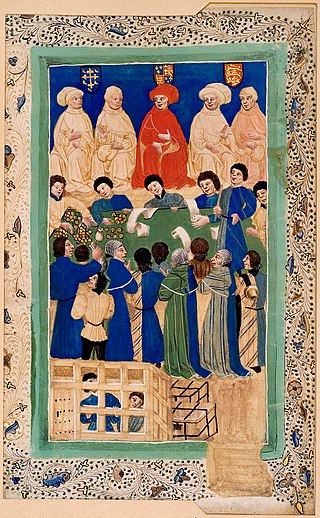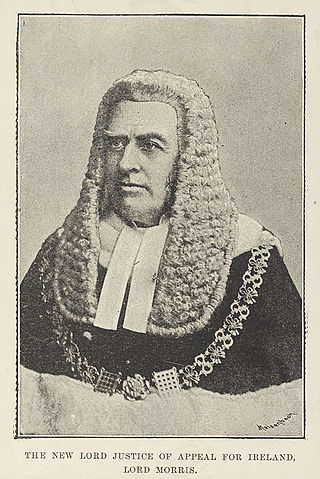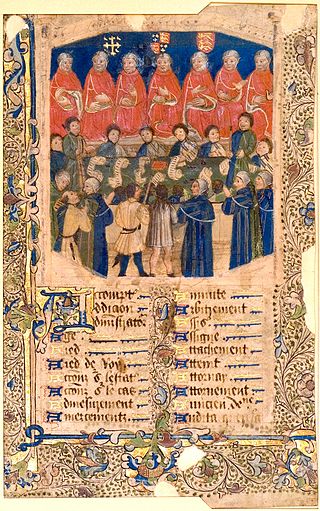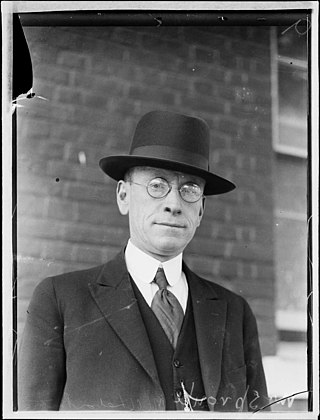Related Research Articles

The Court of Chancery was a court of equity in England and Wales that followed a set of loose rules to avoid a slow pace of change and possible harshness of the common law. The Chancery had jurisdiction over all matters of equity, including trusts, land law, the estates of lunatics and the guardianship of infants.

The Exchequer of Pleas, or Court of Exchequer, was a court that dealt with matters of equity, a set of legal principles based on natural law and common law in England and Wales. Originally part of the curia regis, or King's Council, the Exchequer of Pleas split from the curia in the 1190s to sit as an independent central court. The Court of Chancery's reputation for tardiness and expense resulted in much of its business transferring to the Exchequer. The Exchequer and Chancery, with similar jurisdictions, drew closer together over the years until an argument was made during the 19th century that having two seemingly identical courts was unnecessary. As a result, the Exchequer lost its equity jurisdiction. With the Judicature Acts, the Exchequer was formally dissolved as a judicial body by an Order in Council on 16 December 1880.
The Office of the Official Solicitor is a part of the Ministry of Justice of the Government of the United Kingdom. The Official Solicitor acts for people who, because they lack mental capacity and cannot properly manage their own affairs, are unable to represent themselves and no other suitable person or agency is able or willing to act. The Official Solicitor acts for England and Wales only, as Scotland and Northern Ireland have separate legal systems and judiciaries.

The Attorney-General for Ireland was an Irish and then United Kingdom government office-holder. He was senior in rank to the Solicitor-General for Ireland: both advised the Crown on Irish legal matters. With the establishment of the Irish Free State in 1922, the duties of the Attorney-General and Solicitor-General for Ireland were taken over by the Attorney General of Ireland. The office of Solicitor-General for Ireland was abolished at the same time for reasons of economy. This led to repeated complaints from the first Attorney General of Ireland, Hugh Kennedy, about the "immense volume of work" which he was now forced to deal with single-handedly.

The Reis ül-Küttab, or Reis Efendi, was a senior post in the administration of the Ottoman Empire. Translated as "chief of the scribes" or "head clerk", the holder of the post was originally the head of the chancery of the Imperial Council, evolving into an analogue to a Foreign Minister. In 1836, the title of reis ül-küttab was formally changed to Foreign Minister with the establishment of the Ottoman Ministry of Foreign Affairs during the Tanzimat reforms.

The Clerk of the Crown in Chancery in Great Britain is a senior civil servant who is the head of the Crown Office.
A clerk of the peace held an office in England and Wales whose responsibility was the records of the quarter sessions and the framing of presentments and indictments. They had legal training, so that they could advise justices of the peace.

The Court of Common Pleas, or Common Bench, was a common law court in the English legal system that covered "common pleas"; actions between subject and subject, which did not concern the king. Created in the late 12th to early 13th century after splitting from the Exchequer of Pleas, the Common Pleas served as one of the central English courts for around 600 years. Authorised by Magna Carta to sit in a fixed location, the Common Pleas sat in Westminster Hall for its entire existence, joined by the Exchequer of Pleas and Court of King's Bench.

The term "chancery hand" can refer to either of two distinct styles of historical handwriting.

The Court of Chancery was a court which exercised equitable jurisdiction in Ireland until its abolition as part of the reform of the court system in 1877. It was the court in which the Lord Chancellor of Ireland presided. Its final sitting place was at the Four Courts in Dublin, which still stands.
Frederick Garling was an English attorney and solicitor, and was one of the first solicitors admitted in Australia and was regarded as the first senior solicitor of the second Supreme Court established in the colony of New South Wales. Garling is recognised as being one of the first Crown Solicitors in Australia.

Chancery Lane is a one-way street that forms part of the western boundary of the City of London. The east side of the street is entirely within the City, whilst the west side is in the City of Westminster south of Carey Street and the London Borough of Camden north of that street. The route originated as a 'new lane' created by the Knights Templar from their original 'old Temple' on the site of the present Southampton Buildings on Holborn, in order to access to their newly acquired property to the south of Fleet Street sometime before 1161.
The Six Clerks' Office was a public legal office that served the equitable jurisdiction of the English Court of Chancery in London, England, until the mid-19th century.
A chancery or chancellery is a medieval writing office, responsible for the production of official documents. The title of chancellor, for the head of the office, came to be held by important ministers in a number of states, and remains the title of the heads of government in modern Germany and Austria. Chancery hand is a term for various types of handwriting associated with chanceries.
Robert Caesar was an English lawyer and politician who sat in the House of Commons in 1625 and 1626.

Robert Sproule was an Irish-born Australian public servant and politician who served as Solicitor General for New South Wales from 1920 until 1922.
The Clerk of the Crown and Hanaper was a civil servant within the Irish Chancery in the Dublin Castle administration. His duties corresponded to the offices of Clerk of the Crown and Clerk of the Hanaper in the English Chancery. Latterly, the office's most important functions were to issue writs of election to the Westminster Parliament, both for the House of Commons and for Irish representative peer in the House of Lords.

During the early 17th century, England's relative naval power deteriorated; in the course of the rest of the 17th century, the office of the Admiralty and Marine Affairs steered the Navy's transition from a semi-amateur Navy Royal fighting in conjunction with private vessels into a fully professional institution, a Royal Navy. Its financial provisions were gradually regularised, it came to rely on dedicated warships only, and it developed a professional officer corps with a defined career structure, superseding an earlier mix of sailors and socially prominent former soldiers.
The Royal Commission on the Inns of Court carried out an investigation into the Inns of Court and associated Inns of Chancery between 1854 and 1855. The inns were medieval guild-like institutions that provided accommodation for lawyers and had developed gradually into centres for legal education. All barristers in the country had to be a member of one of the inns. It included many of the leading lawyers and jurists of the time. The commission found many of the inns, particularly the Inns of Chancery, were ineffective at educating students and recommended the creation of a single university of law. Steps were taken to accomplish this and a parliamentary bill was prepared but it was never achieved. The commission did, however, have an influence on legal education for decades and was a factor in the establishment of modern law schools at the universities of Cambridge, Oxford and London.
The Crown Office, also known as the Crown Office in Chancery, is a section of the Ministry of Justice. It has custody of the Great Seal of the Realm, and has certain administrative functions in connection with the courts and the judicial process, as well as functions relating to the electoral process for House of Commons elections, to the keeping of the Roll of the Peerage, and to the preparation of royal documents such as warrants required to pass under the royal sign-manual, fiats, letters patent, etc. In legal documents, the Crown Office refers to the office of the Clerk of the Crown in Chancery.
References
- ↑ "An Introduction to Petty Bag Proceedings in the Reign of Elizabeth I" . Retrieved 12 September 2019.
- ↑ "Records of the Petty Bag Office". National Archives. Retrieved 12 September 2019.